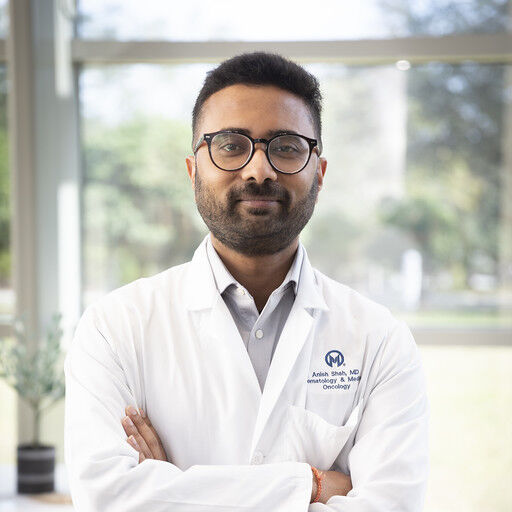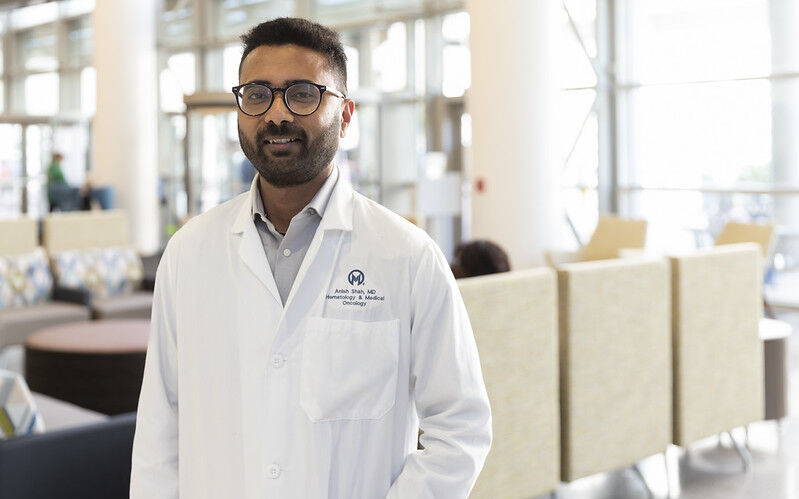Bridging Borders in the Fight Against Cancer
Anish Shah, MD, a Moffitt Cancer Center fellow, embodies the spirit of global health and service as he bridges two worlds in the fight against cancer. Born and raised in Janakpur, Nepal, Shah is dedicated to addressing cancer disparities in his homeland while undergoing advanced training at one of the world's premier cancer institutions.
Shah’s journey began in a small town known for its cultural and religious history. After completing medical school in Nepal, where doctors are primarily trained to work in rural areas, he realized his passion for oncology.
“In Nepal, medical students often start working immediately after graduation, usually in underserved areas. That experience shaped my understanding of health care disparities and ignited my interest in cancer care,” Shah said.
After two years of working in rural Nepal and the capital city Kathmandu, Shah pursued further training in the United States, completing his internal medicine residency in New York before joining Moffitt as a fellow.
“Moffitt is everything I hoped for and more,” he said. “The people here are incredible, and the training is world class. It’s a dream come true.”
While excelling in his fellowship, Shah has maintained a deep connection to his country through his work with the Binaytara Foundation. This foundation operates a 20-bed cancer center in Janakpur, Nepal and is a vital resource in a region where specialized care is scarce. Prior to the center’s establishment, the nearest facility was an eight-hour journey by road.
“When the center opened, it was groundbreaking,” Shah said. “I initially volunteered to understand the types of cancer affecting my community. I discovered that 60% of patients were presenting with stage IV cancer, often with no options beyond palliative care. That was a wake-up call.”
Shah’s contributions have been transformative. He helped implement Nepal’s first electronic medical record system at the cancer center, ensuring better continuity of care. He worked closely with local doctors to design and launch the system, addressing challenges such as lost patient records and the financial burden of repeat diagnostic tests. “This was a game-changer,” he said. “Now, we’re able to provide more efficient and reliable care.”
He also moderates weekly virtual tumor boards, bringing together experts from institutions like the University of California, San Francisco and Stanford to discuss cases from Nepal. These sessions are critical in adapting advanced cancer treatments to the limited resources available locally.

“My role is to ensure that international recommendations align with the realities of health care in Nepal,” Shah explained. “For example, we must consider the lack of insurance, limited access to radiotherapy and other logistical challenges.”
One recent case involved a 17-year-old girl who returned to the cancer center with a mild cough, years after being treated for lymphoma. Shah and the team’s swift investigation revealed a significant relapse, enabling her to be referred promptly for advanced care. “This case highlighted the importance of having a specialized cancer center nearby,” he said. “Without it, her condition might have gone undiagnosed until it was too late.”
Shah identifies two major challenges in low- and middle-income countries: lack of awareness and stigma.
“In Nepal, cancer is often seen as a death sentence. People fear isolation and judgment if diagnosed,” he said.
To combat this, the foundation organizes community health camps, providing free screenings and education about early detection. “We’re trying to change the narrative,” Shah emphasized. “Cancer is preventable, treatable and often manageable. Awareness is key.”
Shah’s ultimate goal is to return to Nepal and contribute to systemic changes in cancer care. “I want to use my training to make a lasting impact,” he said.
He envisions collaborating with nonprofits and government agencies to integrate cancer education into school curriculums and expand access to screening and treatment. He says that changing the perception about cancer must start at the grassroots level.
At Moffitt, Shah draws inspiration from his mentors and the patients he serves.
“Seeing patients here hold onto hope, even in the most challenging circumstances, motivates me,” he said. “It’s a privilege to be part of their journey and to bring that perspective back to Nepal.”
Shah’s story is a powerful reminder that cancer care transcends borders. His commitment to his roots and his drive to improve health care systems reflect the heart of Moffitt’s mission: to contribute to the prevention and cure of cancer.




